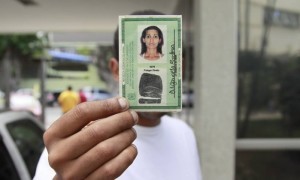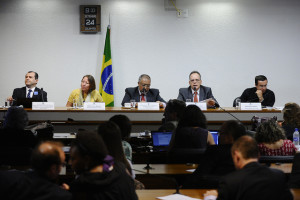On February 5 of 2018, Senator Magno Malta (PR) proposed to archive the draft bill (SUG) N. 15/2014 on the Commission of Human Rights and Participative Legislation (CDH). In a quick reaction, the feminist movement initiated a new ballot initiative mirroring the SUG 15/2014 in order to reestablish the bill in case the Senate majority accepts the proposal.
We, the Sexuality Policy Watch, believe that in order to fully understand the meaning of this move, it is necessary to retrace the draft bill trajectory initiated in 2014. Among other reasons, we believe SUG N. 14’s memory has been lost in the national political turmoil of the last three years that especially undermined the sexual and reproductive rights agenda – the President Dilma Roussef’s impeachment, the surface of many corruption schemes, the deterrence of many established rights, among many other events – even with the relevance of the right to abortion being constantly on the national agenda during this period as SPW has reported before. (Read here.)
The draft bill 15/2014 was forwarded to the Senate as a ballot initiative after popular commotion and indignation provoked by the tragic deaths of Jandira Magdalena dos Santos Cruz on August 26, 2014 and of Elizângela Barbosa on September 21, 2014, victims of unsafe clandestine abortion procedures in Rio de Janeiro and in Niteroi, respectively. Since these episodes happened on the eve of the Presidential elections, no public authority – at local, state or federal level – made any public announcements, mourned their deaths or dared to suggest any measures to stank further life losses in order to prevent disturbing the religious electoral base, albeit minor left parties objections and the launch of a massive police investigation that arrested 47 people accused of performing illegal abortion. Civil society, however, manifested through a public petition, dozens of opinion articles, feminists organized rallies and through the draft bill proposing the legalization of abortion in the Public Health System (SUS), originated from a public suggestion via the Senate website. André Kipper, a digital activist who defends the decriminalization of marijuana, initiated the legislative suggestion. The initiative quickly gained momentum on the public indignation, reaching twenty thousand favorable signatures, which pushed the Senate to start processing the initiative as a draft bill. (Read here on the full political context at the time.)
The bill was initially forwarded to Senator Marta Suplicy (Worker’s Party then), known for her long history of claiming for women’s rights and the right to abortion in the end of 2014. On March 2015, however, she was already negotiating her transition to right wing PMDB (same party from unelected President Temer). Due to the new affiliation, she declared she would no longer work in women’s rights related issued, and so delivered the bill to Senator Magno Malta, an evangelical character known for his position on abortion and homosexuality and by the constant use of fear against pedophilia and the loss of “Christian values” to incite fear of his religious electoral base. (Read here.)
In order to prevent the start of the processing under the control of Malta, feminists were able to articulate with friendly members of the House the promotion of five public hearings. The feminist incidence in these events was crucial to bring voices to the Senate who would advocate for the legalization of abortion. Feminists approached the subject from different viewpoints, such as Medicine, Philosophy, Law and Social Sciences, thus making a solid and diverse argument in favor of this right.
This cycle of the Senate debates also counted with the presence of two international specialists, who have a tremendous experience in the defense of the right to abortion in their own countries. Teresa Blandón, the Nicaraguan feminist, shared her country experience where abortion was completely banned in 2007, which entailed iniquitous consequences to the life and health of women in Nicaragua. And present there was also Letícia Bonifaz, a Mexican lawyer who worked closely with the Supreme Court over the successful debates on the constitutionality of abortion in the Mexico Federal District in 2007. (Read here.)
The Sexuality Policy Watch recovered the register of this rich debate and makes the papers and articles produced by SPW and other vehicles available. We also offer a more thorough recollection in Portuguese, which includes the videos from the Public Hearings. These contents offer a solid argument base to question the proposition to archive the SUG 15/2014 now in debate.
Abortion politics in Brazil: a wider frontline to cope with – SPW
As the Brazilian crisis unfolds, the abortion frontlines keep burning – SPW
Struggling for legal abortion in Brazil: The Congress frontline – SPW
The abortion frontline in Brazil: one step forward – SPW
Brazil’s Criminal Abortion Laws Are Killing Women – Reality Check
Aborto clandestino en Brasil provoca muertes trágicas – Diário Rotativo (México)
Stigma of Brazil abortions in spotlight in case of missing woman – The Global and Mail (Canada)
As Women Die from Illegal Abortions in Brazil, Presidential Candidates Remain Silent – News Vice
Brazil election candidates stay silent on abortion issue – BBC
Abortion and Human Rights: Will Brazil be the Next Nicaragua? – Rewire
Zika and abortion rights: Brazil in the eye of the storm – SPW
As Women Die from Illegal Abortions in Brazil, Presidential Candidates Remain Silent – SPW
Unsafe abortion: another facet of femicide in Latin America – SPW
Abortion in Brazil: a matter of life and death – The Guardian




